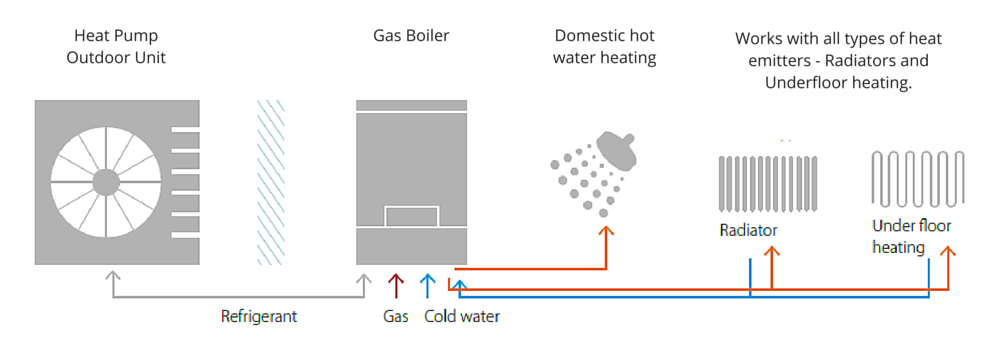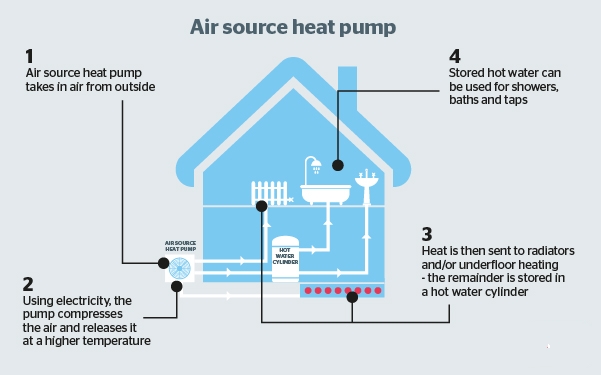Air Source Heat Pumps

With the effects of climate change becoming increasingly apparent, people are striving for a more green way of living. This is why air source heat pumps (ASHPs) have become more popular in recent years.
What is an air source heat pump?
Air source heat pumps work by extracting heat from the outside air – similar to how a fridge extracts heat from its inside.
As the pump absorbes the heat from the outside air (temperature outside can be as low as -15) this heat can then be used to heat radiators, underfloor heating and hot water. Although ASHPs will still have some impact on the environment (they require electricity to run a pump) they are still far more enviornmentally friendly than a traditional oil or LPG boiler as the heat they extract from the ground, air or water is being renewed naturally. There may be ways to reduce the cost of running your pump if you add Solar PV to your system.
How do air source heat pumps work?
Air source heat pumps extract air from outside, this air then flows through tubes containing refrigerant, using electricity, the pump compresses the air, increasing the temperature of the refrigerant and then turns the heated liquid refrigerant into gas. This gas is then compressed, releasing heat into the system which provides you with hot water and heating, it is then released back into a liquid state.
Is an air source heat pump suitable for me?
There are a few things you will need to consider before installing a air source heat pump…
Do you have somewhere to put it?
An air source heat pump needs plently space around it to allow the air to flow in. Ideally it should be on a wall that gets a decent amount of sun.
What fuel are you replacing?
The system should pay for itself over time if it’s replacing electricity or an oil/coal heating system. If you currently use gas to heat your home, heat pumps may not be beneficial to you at todays gas prices. Remember, the cost of buying gas and other fuels continues to rise, wheras with an air source heat pump, other than maintenance, the only on going cost is running the pump.
What type of heating system will you be using?
Air source heating pumps work much more efficiently at a lower temperature than traditional boilers, this means they are best used for underfloor heating systems or larger radiators as they distribute heat at a lower temperature, for a longer period of time.
Is your home well insulated?
For an air source heat pump to be most effective, it is essential that your home has sufficient instulation.
What are the benefits of an air source heat pump?
Potential income through the government’s renewable heat incentive scheme (RHI)
Generally easier to install than a ground source heat pump
Reduce your carbon footprint as they produce less CO2 emissions than conventional heating systems
Lower fuel bills – if you are replacing a conventional electric heating system
You will be buffered from the effect of rising fuel prices
Minimal maintenance required
Hybrid air source heat pump (Bivalent system)
If you live in a well insulated property then an air source heat pump can manage to heat your home all by itself. However, with older properties where it’s simply not possible to achieve the necessary amount of insulation, you can use a hybrid system. This would involve keeping a traditional boiler (gas, oil or LPG) which would work with the air source pump to keep your home warm, year round. If the outside temperature is ideal, the heat pump will operate to keep your home warm while keeping energy use low. When temperatures drop too far below 0, the heat pump system will work in tandem with your boiler, the boiler will kick in to provide sufficient heat when required. The hybrid system could still cut your bills and reduce your carbon footprint.
The system can be set up so the heat pump will automatically switch off to allow the boiler to provide the heat that is required, or both systems can run at the same time. This depends on what system you currently have set up and what is most cost effective for you.

Maintenance
Maintenance of an ASHP is relatively low compared to a traditional boiler. It would need an occasional visual check to make sure there aren’t any plants growing around it or any other obstructions. Unlike your annual boiler service, heat pumps only need to be checked by a professional every 3 years. With this consistent maintenance, an air source heat pump will typically operate for around 20 years.
0131 445 1457


